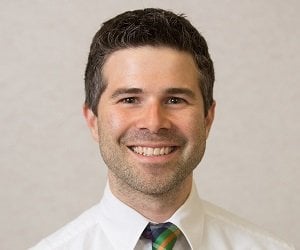
Chronicles of a Med Student: Beginning Clinical Rotations
I walked into my first rotation with a stethoscope and granola bar in my pocket ... Read more
Written by: Adelle
Published on: August 21, 2017

I walked into my first rotation with a stethoscope and granola bar in my pocket ... Read more
Written by: Adelle
Published on: August 21, 2017

The only real recollections I have of visiting the hospital before college were once as ... Read more
Written by: Nicole Hawkins
Published on: August 16, 2017

Before giving you some specific strategies to ace Casper scenarios, it’s important to step back ... Read more
Written by: Behrouz Moemeni
Published on: August 15, 2017

Do you know anyone who raves about their mentor? A mentor can offer you expertise ... Read more
Written by: AAMC Staff
Published on: August 10, 2017

The transition from high school to college is stressful for many students, and perhaps more ... Read more
Written by: Cassie Kosarek
Published on: August 8, 2017

Dr. Shane Quinonez is a Clinical Assistant Professor and the Associate Program Director of the ... Read more
Written by: Student Doctor Network
Published on: August 7, 2017

By Amy Rakowczyk, SDN Staff Writer One of the biggest challenges that arises during medical ... Read more
Written by: Amy Rakowczyk
Published on: August 3, 2017

Shirlene Obuobi draws the life of a medical student in her comic ShirlyWhirl, MD. See ... Read more
Written by: Student Doctor Network
Published on: August 1, 2017

Dear medical students: I’m sorry. You had just finished two years of didactic learning and ... Read more
Written by: Karen Tran-Harding
Published on: July 31, 2017

“So if you don’t mind me asking, why did you make the switch?” I get ... Read more
Written by: Karen Tran-Harding
Published on: July 27, 2017

Republished with permission from here. I spent one year working full-time as a pharmacy technician ... Read more
Written by: Sarayna Schock
Published on: July 26, 2017

Updated February 17, 2022. The article was updated to correct minor grammatical errors and formatting. ... Read more
Written by: Guideline Central
Published on: July 21, 2017

Updated September 2, 2021. The article was updated to correct minor grammatical errors and to ... Read more
Written by: Andrew Josuweit
Published on: July 17, 2017

If your spouse’s medical studies have recently brought you to a new city, or to ... Read more
Written by: Amy Rakowczyk
Published on: July 6, 2017

Sometimes, Susan Mulroney, PhD, professor and director of the special master’s program at Georgetown Medical ... Read more
Written by: Suzanne Barston
Published on: July 5, 2017

Ryan Haynes, PhD and Shiv Gaglani, MBA discuss how they went from anatomy partners ... Read more
Written by: Student Doctor Network
Published on: July 4, 2017

Recently, the Accrediting Council for Graduate Medical Education (ACGME) announced that by 2020, all allopathic ... Read more
Written by: DocThoughts
Published on: July 4, 2017

Republished with permission from here. The future of American health care remains uncertain. It was ... Read more
Written by: Matt Agritelley
Published on: June 28, 2017

Read about steps 1 and 2 in Part 1 of this series here. Right now, ... Read more
Written by: PracticeLink
Published on: June 27, 2017